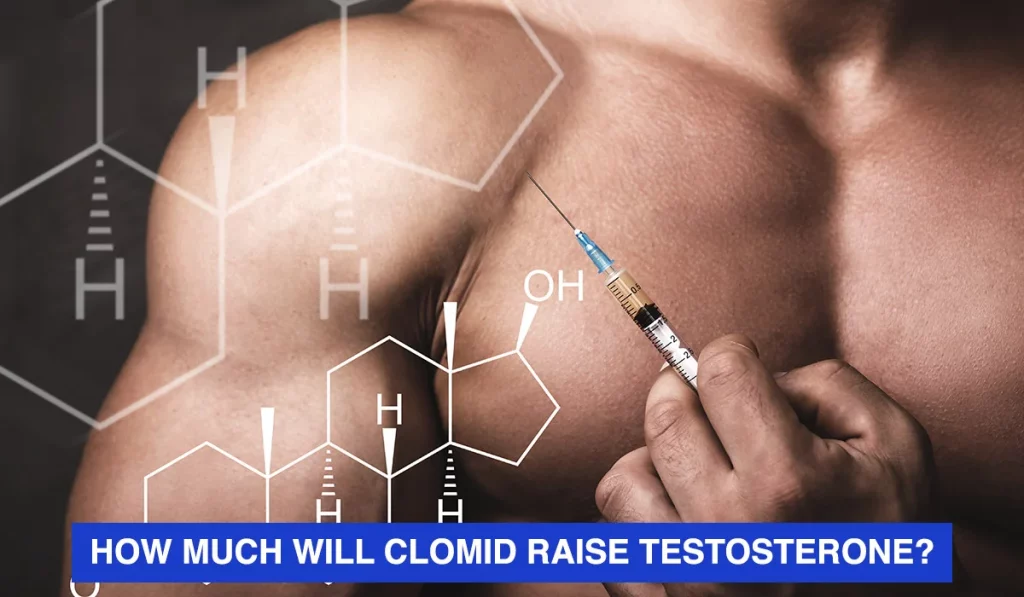Testosterone is a vital male sex hormone produced in the testicles. It is crucial for male health, impacting energy, libido, and overall well-being. Low testosterone levels can result in fatigue, reduced sexual drive, and mood changes.
Clomid is a medication that can help address this imbalance by stimulating testosterone production. By restoring hormonal levels, Clomid may improve energy, enhance libido, and contribute to overall well-being, offering a potential solution for those experiencing symptoms of low testosterone.
What is Low Testosterone?
Low testosterone, also known as Hypogonadism, is characterized by low testosterone levels and often presents symptoms like fatigue, diminished libido, muscle weakness, and mood fluctuations. It can also lead to lower bone density, impaired cognitive function, and an elevated risk of cardiovascular problems.
What is Clomid?
Clomid, or clomiphene citrate, is a pharmaceutical remedy often recommended for the treatment of low testosterone levels in men, according to Webmd.com. Its mechanism involves the stimulation of hormone production, specifically triggering the release of testosterone, to restore hormonal equilibrium and enhance fertility.
Clomid is frequently used in the treatment of male infertility to boost the production of hormones essential for sperm generation. It is prescribed to enhance the release of luteinizing hormone (LH) and follicle-stimulating hormone (FSH), thereby aiding sperm production.
Furthermore, Clomid is often recommended when hormonal imbalances are a contributing factor to male reproductive issues, assisting in the restoration of appropriate hormonal levels.
How can Clomid be used to treat low Testosterone Symptoms?

To treat low testosterone symptoms, Clomid can be used to boost the production of testosterone in the body. Clomid operates as a selective estrogen receptor modulator (SERM), specifically engaging with estrogen receptors in the hypothalamus. Doing so disrupts negative feedback signals, prompting an augmented secretion of gonadotropin-releasing hormone (GnRH).
This, in turn, stimulates the pituitary gland to release increased amounts of luteinizing hormone (LH) and follicle-stimulating hormone (FSH), ultimately elevating natural testosterone production in the testes and fostering improved fertility for both genders.
There are five potential benefits of Clomid, which can effectively address low testosterone symptoms. These are stimulation of testosterone production, enhanced spermatogenesis, maintenance of fertility, symptom improvement, and avoidance of exogenous testosterone.
- Stimulation of Testosterone Production: Clomid blocks estrogen receptors in the hypothalamus and pituitary gland. This action leads to increased production of gonadotropins such as luteinizing hormone (LH) and follicle-stimulating hormone (FSH), subsequently stimulating the testes to produce more testosterone.
- Enhanced Spermatogenesis: Some studies propose that Clomid may boost sperm production in men with low testosterone. Elevating luteinizing hormone and follicle-stimulating hormone levels potentially facilitates the maturation of sperm cells, which could positively impact fertility.
- Maintenance of Fertility: For men wanting to address low testosterone while preserving or enhancing fertility, Clomid may present itself as an option. It elevates testosterone without significantly suppressing sperm production, unlike some other testosterone replacement therapies.
- Symptom Improvement: Men with low testosterone often experience symptoms like fatigue, reduced libido, and mood changes. The potential increase in testosterone levels through Clomid usage may contribute to symptom alleviation, promoting an overall sense of well-being.
- Avoidance of Exogenous Testosterone: Clomid offers an alternative to men who wish to avoid exogenous testosterone. While testosterone therapy can be effective, it may suppress the body’s natural testosterone production, potentially causing fertility issues and other side effects.
Clomid stands apart from traditional testosterone replacement therapy (TRT) as it focuses on stimulating the body’s inherent hormone production rather than providing external testosterone directly.
This method not only helps steer clear of potential side effects linked to administering external testosterone but also aids in safeguarding fertility by sustaining the normal operation of the hypothalamus-pituitary-gonadal axis.
Clomid’s distinctive mechanism of action positions it as a preferred choice for those seeking a more natural and comprehensive approach to hormone optimization, striking a balance between hormonal well-being and fertility preservation.
Optimal dosage and Cycle
The accurate dosage of Clomid for males is still being evaluated, so patients are recommended to start the treatment with a lower dose and then increase it according to their needs and tolerance level. The targeted patient should start with 25mg to 50mg daily until they have attained their goals.
The dosage of Clomid is also available in the form of 50 mg tablets, which should be consumed for five days. However, it would be best if you consult a physician and not self-medicate.
Does Clomid increase testosterone permanently?
No, Clomid does not increase testosterone permanently. Its effects are temporary and focused on stimulating the body’s natural testosterone production.
How much will Clomid raise testosterone?

Clomid can raise testosterone to 100% in men while preserving sperm production, as per the reports of brandeismd.com. This means that if you had an initial level of 300 ng/dL, you can expect it to increase to 600 ng/dL. Some clients may even experience a larger increase.
In a small experiment involving 22 men with infertility issues, they were dosed with 25 mg of Clomid.
The dosage increased their testosterone by 99.2% on average. In another study, men with low testosterone levels (300 ng/dL) were dosed with 25 mg of Clomid for 4-6 weeks, and their testosterone increased to a higher level (600 ng/dL).
Potential Side Effects
The potential side effects of clomid treatment may include changes in mood, changes in libido, headaches, changes in energy levels, mild acne, increase in hemoglobin, and increased aggression. In severe cases, it may also lead to blurred vision, tenderness of the pectoral muscle, male-patterned baldness, and even acceleration of prostate cancer.
FAQs
Is Clomid better than TRT?
Yes, Clomid is better than Testosterone Replacement Therapy if you want to boost the production of testosterone inherently and not increase it in numbers in the body.
When will I see a rise in testosterone levels after taking Clomid?
After 4-6 weeks, you may see a rise in testosterone levels after taking the Clomid treatment.
How can I know whether Clomid is effective for me?
To know whether Clomid is effective for you or not, you can go through a blood test in the second half of the cycle, i.e., after 15 days, to measure the testosterone level in your body.
What are the other use cases for Clomid?
The other use cases for Clomid include addressing infertility symptoms and polycystic ovary syndrome in women.
What are the alternatives to Clomid?
TRT (Testosterone Replacement Therapy) and HCG (Human Chorionic Gonadotropic) are some of the alternatives to Clomid.
Where Can I Buy Clomid?
You can buy Clomid from Buy Roids Canada.
Final Thoughts
Exploring Clomid as a solution for low testosterone levels in men highlights potential advantages, including enhanced sperm count and quality. However, individuals should be cautious of associated side effects like mood swings and visual disturbances.
Consulting with a healthcare professional remains crucial to determine the right dosage and assess the suitability of Clomid for addressing individual testosterone-related issues in men.
References
- Understanding How Testosterone Affects Men. (2016, April 25). National Institutes of Health (NIH). https://www.nih.gov/news-events/nih-research-matters/understanding-how-testosterone-affects-men
- Low Testosterone: Symptoms, Diagnosis & Treatment – Urology Care Foundation. (n.d.). https://www.urologyhealth.org/urology-a-z/l/low-testosterone
- Clomid Oral: Uses, Side Effects, Interactions, Pictures, Warnings & Dosing – WebMD. (n.d.). https://www.webmd.com/drugs/2/drug-11204/clomid-oral/details
- Marconi, M., Souper, R., Hartmann, J., Alvarez, M., Fuentes, I., & Guarda, F. J. (2016). Clomiphene citrate treatment for late onset hypogonadism: Rise and fall. International Brazilian Journal of Urology : Official Journal of the Brazilian Society of Urology, 42(6), 1190-1194. https://doi.org/10.1590/S1677-5538.IBJU.2016.0112
- Shabsigh, A., Kang, Y., Shabsign, R., Gonzalez, M. D., Liberson, G., Fisch, H., & Goluboff, E. T. (2005, September 1). Clomiphene Citrate Effects on Testosterone/Estrogen Ratio in Male Hypogonadism. The Journal of Sexual Medicine. https://doi.org/10.1111/j.1743-6109.2005.00075.x
- CLOMID FOR MEN ON TESTOSTERONE REPLACEMENT THERAPY. (n.d.). https://innovativemen.com/blog/clomid-for-men-on-testosterone-replacement-therapy
- Steve Silvestro, MD. OCT 25, 2022. Clomid vs TRT: what’s better for increasing testosterone?
- https://ro.co/erectile-dysfunction/clomid-vs-trt/
- Male Fertility Drugs. (2023, June 8). University of Utah Health | University of Utah Health. https://healthcare.utah.edu/fertility/treatments/male-fertility-drugs



